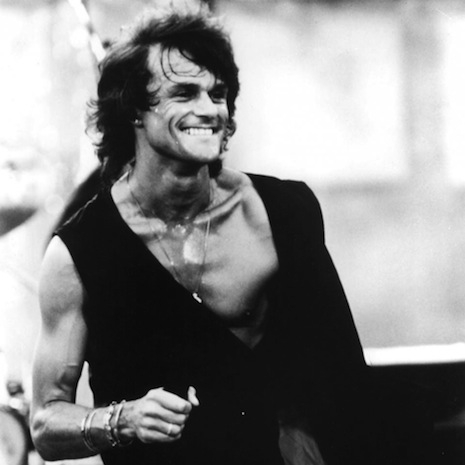
Musician/actor Michael Des Barres has worn many hats over his decades-long career. As a vocalist, he’s fronted such acts as the Power Station, filling in for the departed Robert Palmer on their lone US tour (with a high profile appearance at Live Aid), and the highly underrated Silverhead, one of the finest groups of the glam rock era. He’s also released a handful of solo albums, including Somebody Up There Likes Me, a neglected LP that deserved better. His biggest success (in the form of royalties) has been as songwriter, having co-penned “Obsession,” a worldwide hit for ‘80s synth-pop act Animotion. In addition, he’s a talented character actor, most known for his recurring role as TV villain Murdoc on Macgyver. His versatility is acknowledged in the title of the fabulous documentary, Michael Des Barres: Who Do You Want Me To Be?, which is currently making the film festival rounds. Dangerous Minds got in touch with the director of the documentary, J. Elvis Weinstein, and asked him some questions via email.
How did you come to know Michael’s work?:
Weinstein: The first time I came to know Michael as a musician was when he joined the Power Station, but I recognized him from TV roles at the time. I was a TV junkie as a kid. He lived in my head as a trivia question for many years. I’d always notice him in TV and movie roles.

The many faces of Murdoc.
How and when did you approach Michael about making a documentary about him? Was he open to the idea or did it take some convincing?:
Weinstein: We met several years ago working on a TV series, me a as writer/producer, he as a cast member. We spoke about writing a book and even did some interviews at the time, but it never materialized. Then a few years ago, we ended up guests on the same radio show and I mentioned we should have done a documentary instead of a book. There was instant agreement; we were shooting within three weeks.
What drove you to make the documentary?:
Weinstein: I knew that there was a great story to be told and that there were things I could learn for myself from telling it.
Michael appears open and frank during the interview segments in the film. Were you surprised by anything he told you? One of the things I learned from watching the film is that Silverhead was really Michael’s project and the other members were hired guns—I never knew!:
Weinstein: Michael was very generous in his willingness to examine and re-examine his life as honestly as possible through this process. I think he realized very early on that I wasn’t striving for a sensationalistic telling of the story but rather a very human one.
As for surprises, I don’t have any specific ones that jump out. While Silverhead were hired musicians, they quickly became a very collaborative and tightly-knit band. Michael was very much the leader but the sound evolved from the players.

A fan shows Michael some love during a Silverhead gig, 1974.
I also learned that Michael and his ex-wife Pamela (Miss Pamela of the GTO’s) met on the set of a movie (the still-unreleased Arizona Slim). It’s really interesting to see some of their first interactions captured on film. What do you make of their relationship, then and now?:
Weinstein: I think the thing that is the coolest about them is the relationship they’ve cultivated since splitting as a couple. The respect, warmth, and love they maintain for one another as friends and parents of a great son is a lovely example for everyone.

Michael’s music career had a lot of momentum leading up to his 1986 solo album Somebody Up There Likes Me, but the record failed to make an impact. I’ve always wondered if the album was even released, as the only copies I saw in stores were stamped “promotional.” Do you know what happened? Did the label decide not to release it at the last minute? In any event, I imagine the experience must have been devastating for Michael, as he obviously put a lot of effort into the project, and then didn’t make another record for decades.:
Weinstein: I’m not sure of the details of the album’s demise. It was definitely released. One of the things I admire about Michael is that by all accounts he was never devastated by these showbiz setbacks. He would recover quickly and get ready for the next thing.

On stage at Live Aid, 1985.
Though Michael has had success, he’s never broken through to a major audience. Why do you think that is?:
Weinstein: I don’t mean to be flippant with this answer, but I think the reason is “because that’s how things go sometimes.” I have asked Michael directly and he doesn’t think there has been any injustice in his career.
What Michael Des Barres works are you particular fond of?:
Weinstein: I like his most recent two albums [Carnaby Street (2012) and The Key To The Universe (2015)] because they show that someone can continue to grow and improve as an artist even after half a century of doing it.

What are your plans for the documentary?:
Weinstein: I’ve been attending film festivals with it (we won the “Best in Show” award at the Macon Film Festival in July) and am seeking a distributor for the film. Stay tuned.
Here’s a clip from Michael Des Barres: Who Do You Want Me To Be?:
Previously on Dangerous Minds:
The decadent marquis, Michael Des Barres, and the legacy of Silverhead